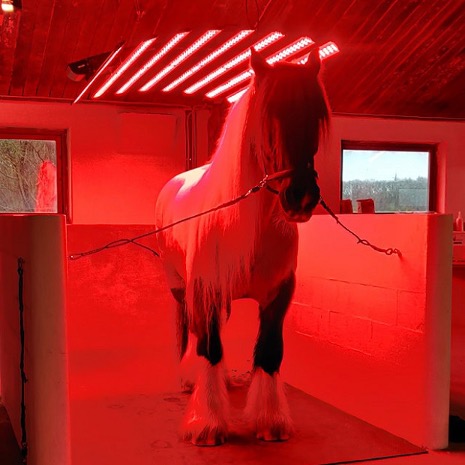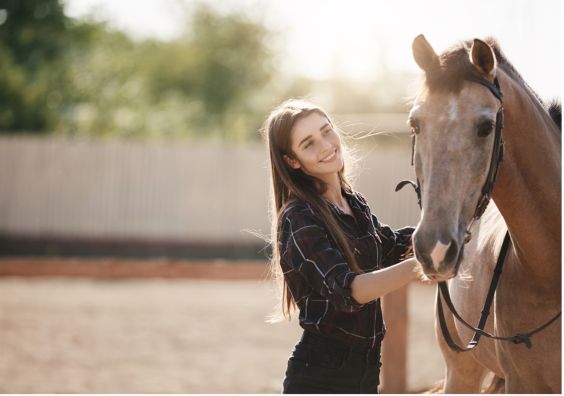Getting your first horse is certainly exciting. However, it’s not uncommon for this excitement to quickly turn into a disaster, especially if you are not yet well-informed about the proper care, maintenance, and responsibilities that come with owning a horse.
Connect with a verified veterinarian in minutes. Licensed vets are available 24/7 to answer your questions. No need to worry about your furry family member.
Before deciding to buy a horse, you should perform an honest self-evaluation and know if you’re ready for it. If you don’t have any riding experience, it might be best to just lease or borrow a horse to practice on first. Furthermore, it’s better to consult a professional horse trainer. Either way, you might want to take note of the following tips:
1. Budget
The cost of buying a horse can vary dramatically according to its age, breed, sex, size, and amount of training. With that said, you have to take some time and reflect on what you really want or need from the horse. For starters, you can browse through various horse breeds online by visiting sites like the Horseyard. You might also want to take note of the following points below:
- Keep in mind that registered horses with papers usually cost more than unregistered or graded ones.
- An older horse is usually priced lower, but the amount of experience and training they have is greater compared to a younger horse.
- The amount of training that the horse has will affect its price.
- The size of the horse can also affect its price. Make sure to choose one that matches your size.
- Avoid buying the first horse that you fall in love with and keep in mind that a good horse will require the same maintenance as another poor-quality one.
2. Best Time To Buy
There are specific times of the year that are considered better for buying horses. Typically, horse prices go down during the winter. However, the selection will be very limited. The best time to buy a horse is during spring and fall, but you can get cheaper prices in fall because sellers avoid to ‘winter’ their horses due to high feed costs.

Review symptoms, medications & behavior to keep your pets healthy with a Vet Online in just minutes.
Ask a Vet Live Now3. Wait For The Best Deals
The best way to find a good deal on horses is to buy from private individuals who may have lost interest in their horses or are looking to buy a better one. These will usually be posted online, in local newspapers, or by word of mouth. So, check out various sources and request your friends to keep a lookout for horses that are listed on sale.
4. Check Online Listings
A great way to buy and sell horses is to look at websites that help you narrow down your search according to location, breed, price range, discipline, and age. These websites also show the horse’s photos, description, and will usually include a video of the horse while being ridden. Once you narrow down your prospects, it is still best to follow-up and inspect the horse personally before finally closing the sale.
5. Check With Trainers And Breeders
Trainers and breeders are also great sources for finding a suitable horse. These people usually maintain their animals in excellent condition and have great knowledge of their horses’ history. Although they may ask for higher prices, the extra cost is worth it—especially for a beginner.
6. Auctions Are For Trained Eyes Only
Getting a horse through an auction comes with risks. This is because it’s difficult to examine and try a horse at an auction and usually, not much is known about the horses’ health records, personality, or history. It’s frustrating to get a horse that turns out to be sick when you brought it to your stable. If you are decided to buy horses at an auction, bring along an expert breeder or trainer to have a closer look.
7. Look For Reputable Horse Dealers
Like breeders and trainers, a horse dealer can also lead you to a suitable deal. Many of them try to match the right horse with the right riders. However, some aren’t that honest. Thus, it’s best to find someone with a good reputation, has fair exchange policies or offers a money-back guarantee.
8. Evaluate Prospects
Don’t settle with the first horse that you can find. List down a few prospects and follow-up on which is the most suitable one for you. Ask questions and inform the seller honestly about your riding ability, needs, and expectations from the horse.
You can ask the seller to see and try the horse for yourself. If you’re not experienced enough, bring a professional with you. The first thing you need to consider is its disposition and training level, which will help you determine the horse’s serviceability and suitability. When the horse is haltered, check its motion and watch out for any indication of lameness or stiffness. Don’t accept any excuse for lameness such as recent removal or new shoes.
Use this time to check the horse’s profile, habits, and watch out for signs of blemishes. In addition, ask for the horse’s medical record for deworming information, latest Coggins testing, and vaccination history. After you’ve decided on a candidate, ask a veterinarian to do a pre-purchase medical exam on the horse.
How To Know If A Horse Is A Good Fit For You
To know if a horse is a good fit for you, consider handling it yourself. Brush it, lead it, and help in saddling and bridling. You and your riding instructor should then ride the horse. Observe if it’s responsive to your aids in a good manner. It should be readily and quickly responsive.
After riding it in the ring, ask to take it into the open fields. If you’re still interested, consult with your horse expert if you should proceed, considering the price, breed, and kind of the horse that was offered.
If you’re still keen on buying it, ask the seller for a trial period. It’s up to you and the seller to create your terms and conditions for the trial period. Just make sure that everything is laid down in a written agreement so both of you will understand the conditions and responsibilities that can be demanded from one another throughout the period.
Final Thoughts
Buying an unsuitable horse would always lead to dissatisfaction. Give yourself time to shop around and don’t buy the first horse you see until you’ve checked out other prospects. Aside from the price itself, you must consider the breed, size, and age of the horse would matter.
To get the best deals, you must buy in the fall where many breeders are trying to dispose horses quickly to avoid high costs during the winter. Asking professional trainers, breeders, and reputable dealers can also help you get the best deals on certain horse breeds.
Connect with a verified veterinarian in minutes. Licensed vets are available 24/7 to answer your questions. No need to worry about your furry family member.

Tom
Tom has always loved to write since he was little - he wanted to be either a writer or a veterinary doctor, but he ended up being a professional writer while most of his works are based on animals. He was born in San Francisco but later moved to Texas to continue his job as a writer. He graduated from the University of San Francisco where he studied biotechnology. He is happily married and a soon to be father!
Review symptoms, medications & behavior to keep your pets healthy with a Vet Online in just minutes.
Ask a Vet Live Now



